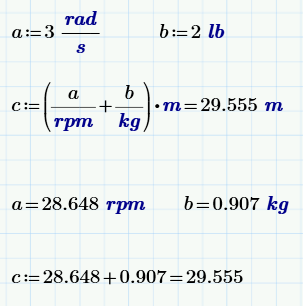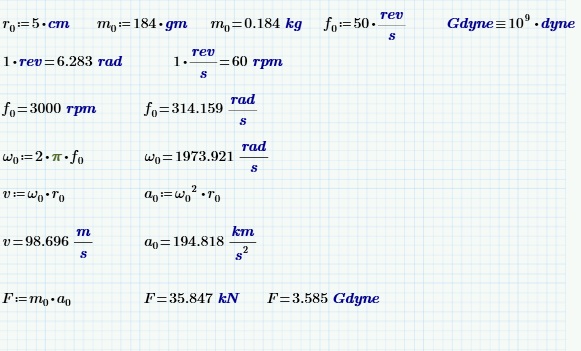Community Tip - Did you get an answer that solved your problem? Please mark it as an Accepted Solution so others with the same problem can find the answer easily. X
- Subscribe to RSS Feed
- Mark Topic as New
- Mark Topic as Read
- Float this Topic for Current User
- Bookmark
- Subscribe
- Mute
- Printer Friendly Page
Units in equations
- Mark as New
- Bookmark
- Subscribe
- Mute
- Subscribe to RSS Feed
- Permalink
- Notify Moderator
Units in equations
Hi,
I know it is possible to control the unit of the result in an equation. Is this possible as well within the equation itself or do I have to put in a correction value instead?
E.g. I am doing some calculations where the defined variable in the equation must be entered as rpm where as the variable is calculated as rad/s, which is the SI unit.
Thanks in advance,
Ronnie.
- Labels:
-
Other
- Mark as New
- Bookmark
- Subscribe
- Mute
- Subscribe to RSS Feed
- Permalink
- Notify Moderator
You would like use one empirical formula?
May be so

- Mark as New
- Bookmark
- Subscribe
- Mute
- Subscribe to RSS Feed
- Permalink
- Notify Moderator

- Mark as New
- Bookmark
- Subscribe
- Mute
- Subscribe to RSS Feed
- Permalink
- Notify Moderator
You mean something like this?

One metre plus one foot plus two inches, result expressed in metres. But could just as well be in inches:

In general you should avoid to enter any 'correction constants' (especially as constants) in you formulae. Just add the units.
The big advantage of Mathcad (and Prime) is that it can calculate with the units.
Success!
Luc
- Mark as New
- Bookmark
- Subscribe
- Mute
- Subscribe to RSS Feed
- Permalink
- Notify Moderator
A lot of old engineering books give you equations with unit conversion factors "built in," and require values in specific units. If the expression is correctly unit balanced ( torque times shaft speed equals power) then Mathcad will accept any valid unit combination (Newton meters, ft lbf, etc.) and (rpm, rad/sec, deg/hour) and correctly report power (watts, hp, ft lbf/sec, etc) without conversion factors required.
If you expect on unit (hp) and Mathcad adds a few units that you didn't expect you have a problem--Mathcad is balancing units and your left hand expression is not "unit correct."
Unfortunately, some of the old equations were empirical, and what may look like a unit conversion factor is something else. These require careful exploration.


